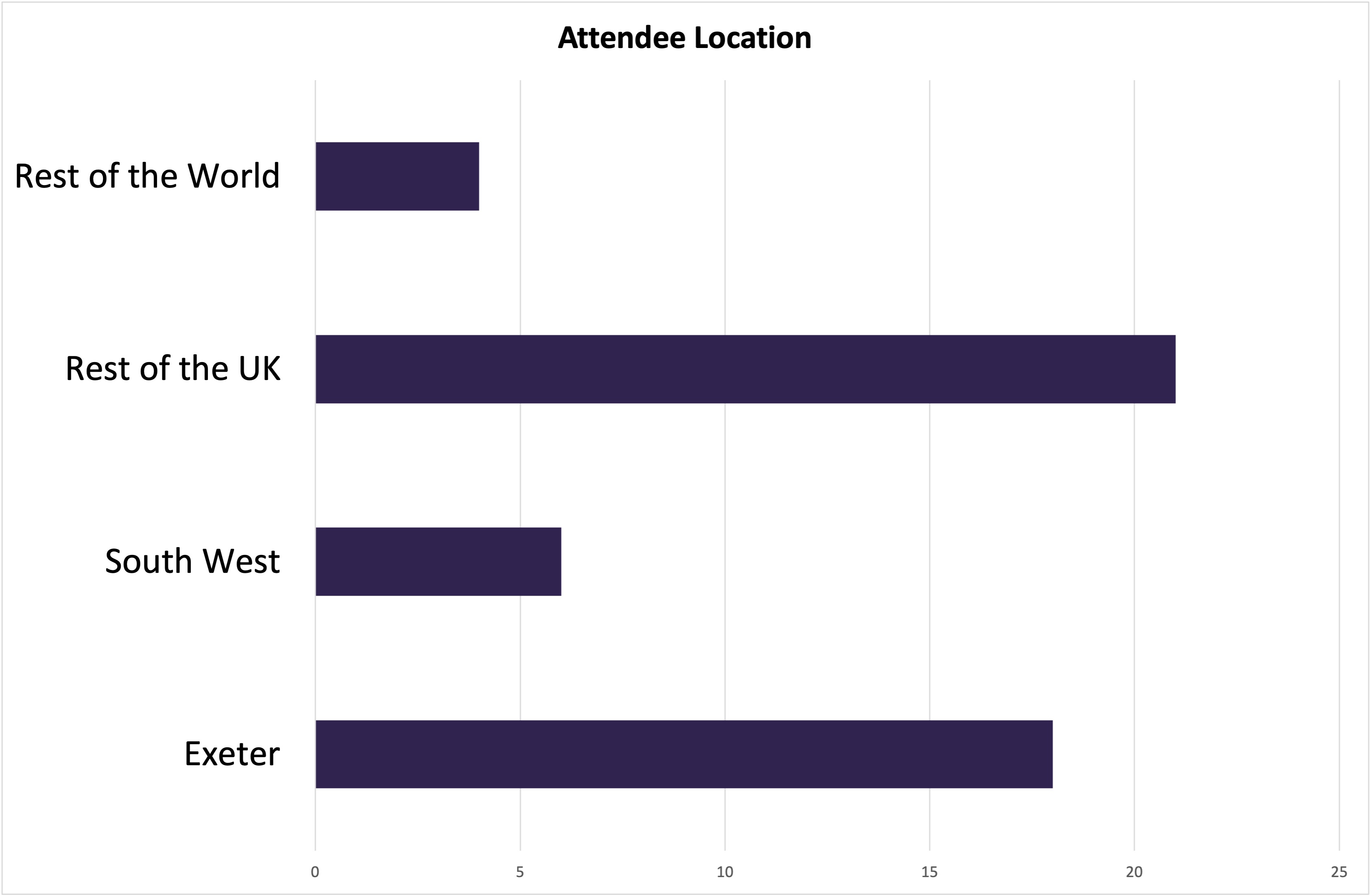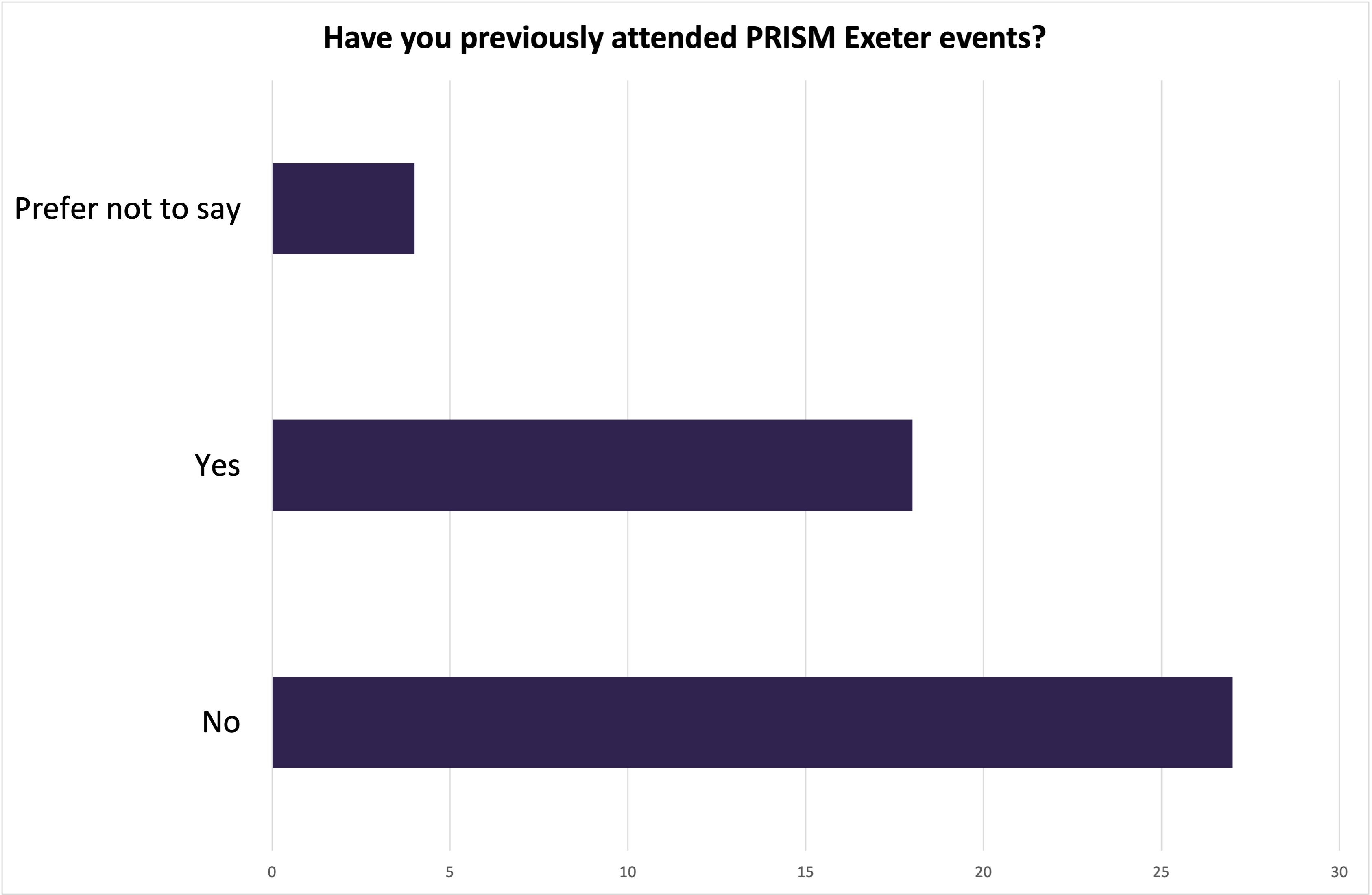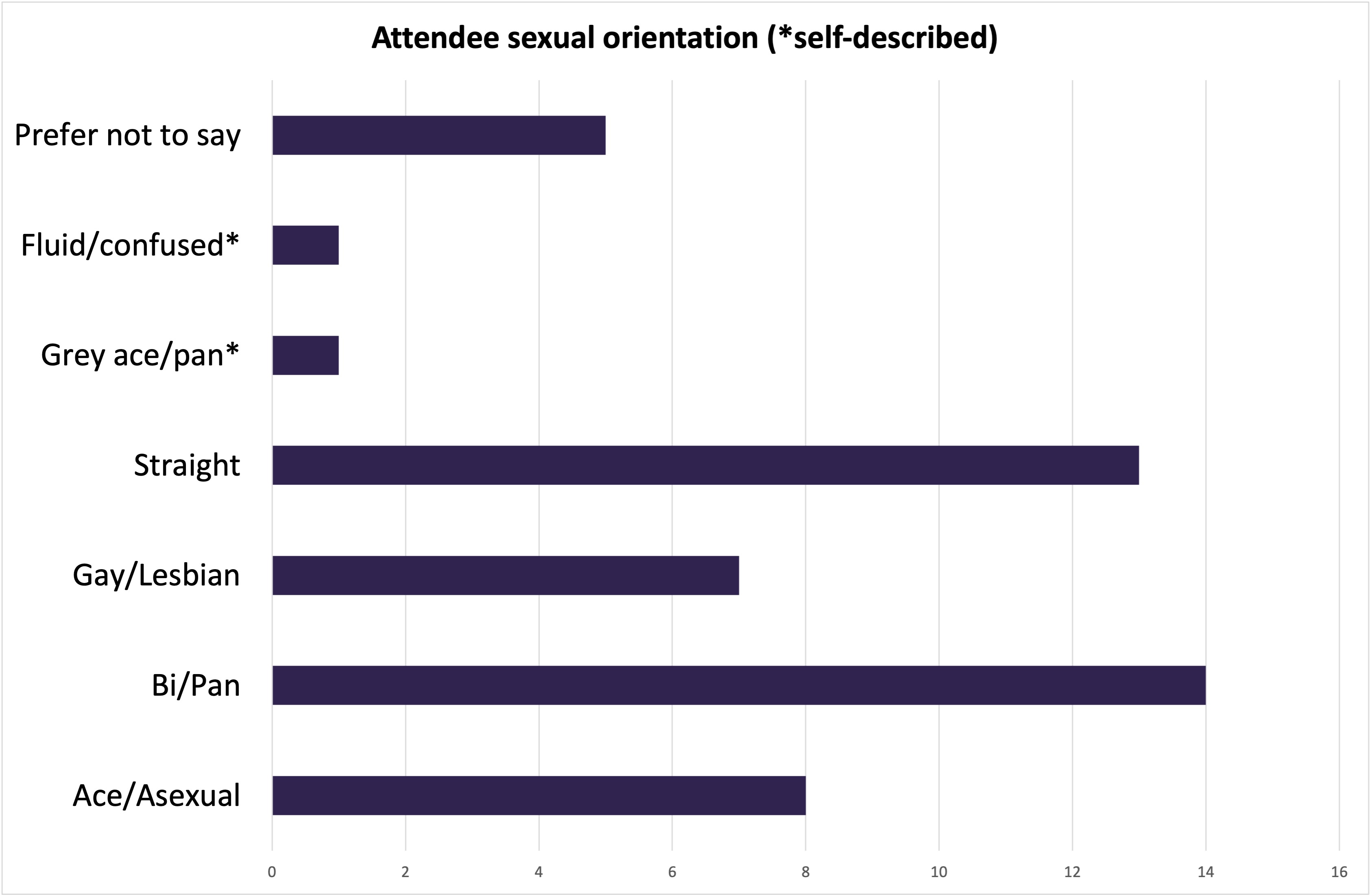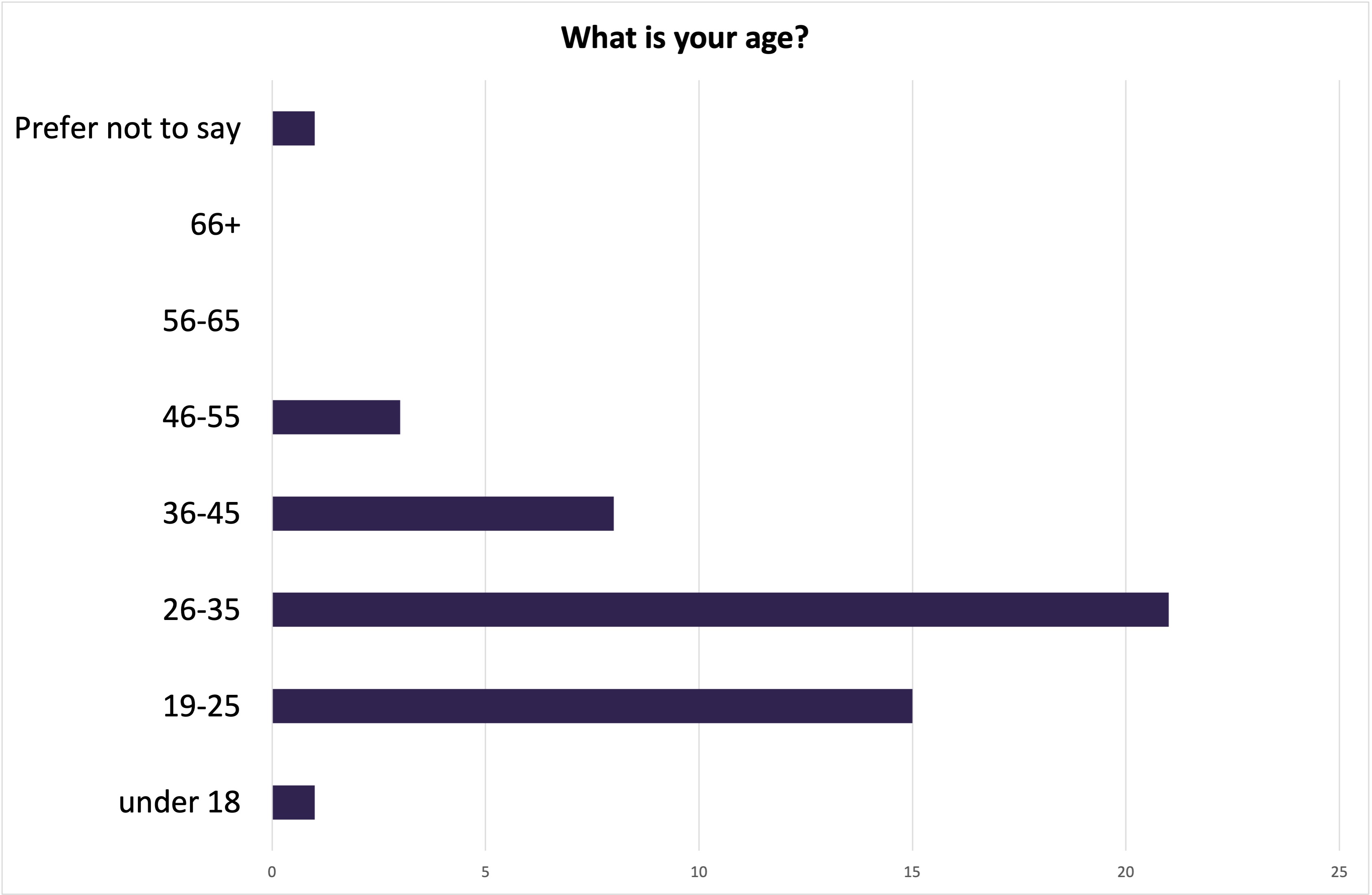PRISM Speakers - July 2021 Insights
Our second event of 2021 took place in July 2021 and marked the 3rd anniversary of PRISM Exeter's foundation on July 5th 2018. The event was hosted on Zoom due to the continuing coronavirus pandemic. Thanks to British Sign Language (BSL) trainee interpreter, Sophie Probert, we were once again able to provide full BSL interpretation at the event. We also made use of the auto-captioning functionality that was introduced on Zoom shortly before the event to assist attendees who were non-native English speakers and/or hard-of-hearing.
We received 64 registrations for the event on Eventbrite, down on our previous event for LGBT History Month. However, we achieved more success in converting these registrants into event attendees with 50 individual logins to the Zoom meeting at some point during the event.
Attendees were provided with an overview of PRISM Exeter's activities to date, including our recent collaboration with the Business and IP Centre Devon to add more inclusive media to Devon Libraries collections. The audience were then treated to talks by Dr Layal Hakim, Senior Lecturer in the University of Exeter's Department of Mathematics, and an LGBTQ+ staff member from the Office for National Statistics, who has requested to remain anonymous outside of the event.
Dr Layal Hakim provided an overview of the explorations of her University of Exeter Education Incubator Project "The Exeter Spectrum Programme", conducted in collaboration with the National Autistic Society (NAS). The project aims to identify how to best support autistic students and is intended to complement existing support mechanisms and activities already undertaken, primarily by the AccessAbility team at the University of Exeter and their mentors. Given the diverse nature of autism spectrum conditions and the individual needs of autistic students, the project particularly assesses the extent to which ‘general advice’ regarding autism can be distilled and given. Dr Hakim presents some of the interesting and practical ideas that emerged, particularly from discussions with the experts from NAS and the project's Autism Champions. A recording of Layal's talk is available to watch below.
Please note that audience questions and comments have been removed from the recording to protect the anonymity of attendees.When accessing the meeting, attendees were asked a series of questions including where they were joining us from, how they described their sexual orientation and their gender, whether they had previously attended any other PRISM Exeter events, and how they heard about the event. We also captured information on the age and ethnicity of our attendees for the first time as we look to assess whether we could improve our event advertising strategy.
 Just over half of attendees (51 %) joined us from outside the South West of
England and we once again enjoyed an international audience with attendees joining
us from as far away as Canada, USA and India.
Just over half of attendees (51 %) joined us from outside the South West of
England and we once again enjoyed an international audience with attendees joining
us from as far away as Canada, USA and India.
 We are continuing to see a considerable fraction of first-time attendees to our
events. Our attendees reported finding out about our event via "work/uni/college/school
emails" (20 %), "word of mouth" (10 %), "social media" (31 %), and
"the PRISM Exeter newsletter" (10 %). We are grateful to everyone who helped
to promote this event, particularly
The Piscopia Initative, a mathematics network
for women and non-binary individuals.
We are continuing to see a considerable fraction of first-time attendees to our
events. Our attendees reported finding out about our event via "work/uni/college/school
emails" (20 %), "word of mouth" (10 %), "social media" (31 %), and
"the PRISM Exeter newsletter" (10 %). We are grateful to everyone who helped
to promote this event, particularly
The Piscopia Initative, a mathematics network
for women and non-binary individuals.
 Through our Speakers series, we aim to highlight that the people working in
STEMM are as diverse as the work that they do. We feel it is important to have
open conversations about being LGBTQ+ in STEMM and hope to help inspire future
generations to take up STEMM subjects. It is important to us that our events
continue to attract both LGBTQ+ individuals and allies alike. When asked about their
identity, 63 % of attendees described their sexualities as LGBQA+, 20.5 %
identified as agender or non-binary, and 20.5 % identified as trans.
Through our Speakers series, we aim to highlight that the people working in
STEMM are as diverse as the work that they do. We feel it is important to have
open conversations about being LGBTQ+ in STEMM and hope to help inspire future
generations to take up STEMM subjects. It is important to us that our events
continue to attract both LGBTQ+ individuals and allies alike. When asked about their
identity, 63 % of attendees described their sexualities as LGBQA+, 20.5 %
identified as agender or non-binary, and 20.5 % identified as trans.
 We also feel it is important to ensure that we are reaching as diverse cross-section
of society as possible. From the outset, we have attempted to make PRISM Exeter events
inclusive to people regardless of their ethnicity and age. At this event, we
found that our audience was predominantly comprised of young professionals and,
while our audience largely reported their ethnicity as White (69 %), we saw
strong BAME representation in the audience (specifically Arab: 2 %; Asian / Asian
British: 10 %; Black / African / Caribbean / Black British: 2 %; Mixed /
Multiple ethnicities: 6 %). For comparison, the 2011 Census reported
the ethnic breakdown of the South West of England as being 95.4 % White.
We also feel it is important to ensure that we are reaching as diverse cross-section
of society as possible. From the outset, we have attempted to make PRISM Exeter events
inclusive to people regardless of their ethnicity and age. At this event, we
found that our audience was predominantly comprised of young professionals and,
while our audience largely reported their ethnicity as White (69 %), we saw
strong BAME representation in the audience (specifically Arab: 2 %; Asian / Asian
British: 10 %; Black / African / Caribbean / Black British: 2 %; Mixed /
Multiple ethnicities: 6 %). For comparison, the 2011 Census reported
the ethnic breakdown of the South West of England as being 95.4 % White.
We are grateful to funds from the Biochemical Society - our 2021 events continue to be supported by Diversity in Science grant funds awarded to our "Taking pride in STEMM" project - as well as support from the University of Exeter, the Met Office, Exeter College, ExIST, Network Rail, the Royal Devon and Exeter NHS trust, Tech Exeter, and the Institute of Physics South West branch.